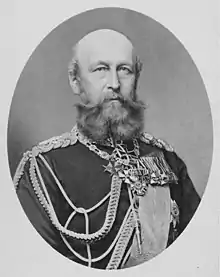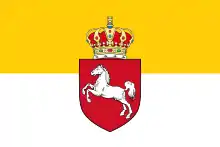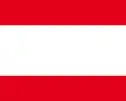Frederick Francis II, Grand Duke of Mecklenburg-Schwerin
Frederick Francis II (German: Friedrich Franz II; 28 February 1823 – 15 April 1883) was a Prussian officer and Grand Duke of Mecklenburg-Schwerin from 7 March 1842 until 15 April 1883.
| Frederick Francis II | |
|---|---|
 | |
| Grand Duke of Mecklenburg-Schwerin | |
| Reign | 7 March 1842 – 15 April 1883 |
| Predecessor | Paul Frederick |
| Successor | Frederick Francis III |
| Born | 28 February 1823 Ludwigslust |
| Died | 15 April 1883 (aged 60) Schwerin |
| Spouse | Princess Augusta Reuss of Köstritz Princess Anna of Hesse and by Rhine Princess Marie of Schwarzburg-Rudolstadt |
| Issue | Frederick Francis III, Grand Duke of Mecklenburg-Schwerin Duke Paul Frederick Grand Duchess Maria Pavlovna of Russia Duke Nikolaus Duke John Albert Duke Alexander Duchess Anna Elisabeth, Grand Duchess of Oldenburg Duke Friedrich William Duke Adolf Friedrich Hendrick, Prince Consort of the Netherlands |
| House | Mecklenburg-Schwerin |
| Father | Paul Frederick, Grand Duke of Mecklenburg-Schwerin |
| Mother | Princess Alexandrine of Prussia |
| Religion | Lutheran |
Biography
He was born in Schloss Ludwigslust, the eldest son of Hereditary Grand Duke Paul Friedrich of Mecklenburg and his wife Princess Alexandrine of Prussia. He became heir apparent to the grand duchy following the death of his great-grandfather Frederick Francis I on 1 February 1837. Frederick Francis was privately educated until 1838. He then attended the Blochmann institute in Dresden before going to the University of Bonn.[1][2] Frederick Francis succeeded his father as Grand Duke on 7 March 1842.
Frederick Francis served on the general staff of Generalfeldmarschall Friedrich Graf von Wrangel during the Second Schleswig War. During the Austro-Prussian War he commanded the forces that occupied Leipzig and lay siege to Nuremberg. He also took part in the Franco-Prussian War, during which he was made Governor-General of Reims and commanded the German forces laying siege to Toul. He defended the Prussian forces during the Siege of Paris from attack by the Army of the Loire. He defeated French forces at the battles of Beaune-La-Rolande and Beaugency. He was a maternal first cousin of both German Emperor Frederick III and Russian Tsar Alexander II. He held the rank of Prussian general and was also a Russian General Field Marshal.[1]
Frederick Francis died on 15 April 1883 in Schwerin. He was succeeded as Grand Duke by his eldest son Frederick Francis III.
Marriages and children
Frederick Francis was first married to Princess Augusta Reuss of Köstritz ( 26 May 1822 – 3 March 1862) on 3 November 1849 in Ludwigslust. They had six children:
- Frederick Francis III, Grand Duke of Mecklenburg-Schwerin (19 March 1851 – 10 April 1897) he married Grand Duchess Anastasia Mikhailovna of Russia on 24 January 1879. They had three children.
- Paul Frederick, Duke of Mecklenburg-Schwerin (19 September 1852 – 17 May 1923) he married Princess Marie of Windisch-Graetz. on 5 May 1881. They have four children.
- Duchess Marie of Mecklenburg-Schwerin (14 May 1854 – 5 September 1920) she married Grand Duke Vladimir Alexandrovich of Russia on 28 August 1874. They had five children.
- Duke Nikolaus of Mecklenburg-Schwerin (18 August 1855 – 23 January 1856) died at four months old
- Duke Johann Albrecht of Mecklenburg-Schwerin (8 December 1857 – 16 February 1920) he married Princess Elisabeth Sybille of Saxe-Weimar-Eisenach (28 February 1854 – 10 July 1908) on 6 November 1886. He remarried Princess Elisabeth of Stolberg-Rossla on 15 December 1909.
- Duke Alexander of Mecklenburg-Schwerin (13 August 1859 – 13 August 1859)
Frederick Francis married for a second time in Darmstadt to Princess Anna of Hesse and by Rhine (25 May 1843 – 16 April 1865) on 4 July 1864. They had one daughter:
- Duchess Anne of Mecklenburg-Schwerin (7 April 1865 – 8 February 1882) died at the age of sixteen.
His third wife was Princess Marie of Schwarzburg-Rudolstadt on 4 July 1868. They had four children:
- Duchess Elisabeth Alexandrine of Mecklenburg-Schwerin (10 August 1869 – 3 September 1955) she married Frederick Augustus II, Grand Duke of Oldenburg on 24 October 1896. They had five children.
- Duke Friedrich Wilhelm of Mecklenburg-Schwerin (5 April 1871 – 22 September 1897) died at the age of twenty-six.
- Duke Adolf Friedrich of Mecklenburg-Schwerin (10 October 1873 – 5 August 1969) he married Princess Viktoria Feodora of Reuss zu Schleiz (21 April 1889 – 18 December 1918) on 24 April 1917. They have one daughter Duchess Woizlawa Feodora of Mecklenburg-Schwerin (1918-2019), later Princess Reuß zu Köstritz. After the death of his first wife, Adolf Friedrich remarried Princess Elisabeth of Stolberg-Rossla on 15 October 1924.
- Duke Heinrich of Mecklenburg-Schwerin ( 19 April 1876 – 3 July 1934) he married Queen Wilhelmina of the Netherlands on 7 February 1901. They had one daughter: Queen Juliana.
Honours
- German decorations[3]
 Mecklenburg:
Mecklenburg:
- Grand Cross of the Wendish Crown, with Crown in Ore and Collar
- Founder of the Military Merit Cross, 5 August 1848 (Schwerin)
 Anhalt: Grand Cross of Albert the Bear, with Swords, 19 September 1864[4]
Anhalt: Grand Cross of Albert the Bear, with Swords, 19 September 1864[4].svg.png.webp) Baden:
Baden:
- Knight of the House Order of Fidelity, 1844[5]
- Grand Cross of the Zähringer Lion, 1844[5]
- Grand Cross of the Military Karl-Friedrich Merit Order, 1871[6]
.svg.png.webp) Bavaria:
Bavaria:
- Knight of St. Hubert, 1856[7]
- Grand Cross of the Military Order of Max Joseph
 Brunswick: Grand Cross of Henry the Lion
Brunswick: Grand Cross of Henry the Lion.svg.png.webp)
.svg.png.webp)
.svg.png.webp) Ernestine duchies: Grand Cross of the Saxe-Ernestine House Order, May 1840[8]
Ernestine duchies: Grand Cross of the Saxe-Ernestine House Order, May 1840[8] Hanover:[9]
Hanover:[9]
 Hesse-Darmstadt: Grand Cross of the Ludwig Order, 25 December 1843[10]
Hesse-Darmstadt: Grand Cross of the Ludwig Order, 25 December 1843[10] Hesse-Kassel: Knight of the Golden Lion, 14 March 1864[11]
Hesse-Kassel: Knight of the Golden Lion, 14 March 1864[11].svg.png.webp) Nassau: Knight of the Gold Lion of Nassau, July 1858[12]
Nassau: Knight of the Gold Lion of Nassau, July 1858[12] Oldenburg: Grand Cross of the Order of Duke Peter Friedrich Ludwig, with Golden Crown, 8 October 1843; with Swords, 31 December 1870[13]
Oldenburg: Grand Cross of the Order of Duke Peter Friedrich Ludwig, with Golden Crown, 8 October 1843; with Swords, 31 December 1870[13].svg.png.webp) Saxe-Weimar-Eisenach: Grand Cross of the White Falcon, 16 February 1840;[14] with Swords, 1871[15]
Saxe-Weimar-Eisenach: Grand Cross of the White Falcon, 16 February 1840;[14] with Swords, 1871[15].svg.png.webp) Saxony: Knight of the Rue Crown, 1842[16]
Saxony: Knight of the Rue Crown, 1842[16].svg.png.webp) Prussia:
Prussia:
- Knight of the Black Eagle, with Collar
- Grand Cross of the Red Eagle, with Swords
- Grand Commander of the Royal House Order of Hohenzollern
- Commander of Honour of the Johanniter Order
- Pour le Mérite, 9 August 1866; with Oak Leaves, 5 December 1870[17]
- Grand Cross of the Iron Cross, 4 December 1871[17]
 Württemberg:[18]
Württemberg:[18]
- Grand Cross of the Military Merit Order, 30 December 1870
- Grand Cross of the Württemberg Crown, 1871
- Foreign decorations[3]
 Austrian Empire: Grand Cross of St. Stephen, 1844[19]
Austrian Empire: Grand Cross of St. Stephen, 1844[19] Denmark: Knight of the Elephant, 5 April 1842[20]
Denmark: Knight of the Elephant, 5 April 1842[20].svg.png.webp) Kingdom of Greece: Grand Cross of the Redeemer
Kingdom of Greece: Grand Cross of the Redeemer Netherlands: Grand Cross of the Gold Lion of Nassau
Netherlands: Grand Cross of the Gold Lion of Nassau.svg.png.webp) Ottoman Empire: Order of Osmanieh, 1st Class
Ottoman Empire: Order of Osmanieh, 1st Class.svg.png.webp) Kingdom of Portugal: Grand Cross of the Tower and Sword
Kingdom of Portugal: Grand Cross of the Tower and Sword Russian Empire:
Russian Empire:
- Knight of St. Andrew
- Knight of St. Alexander Nevsky
- Knight of the White Eagle
- Knight of St. Anna, 1st Class
.svg.png.webp) Spain: Grand Cross of the Order of Charles III, 24 September 1865[21]
Spain: Grand Cross of the Order of Charles III, 24 September 1865[21]
Ancestors
References
- "Obituary - Friedrich Franz II" (PDF). New York Times. 1883-04-16. Retrieved 2007-10-23.
- Garlington, JC (1852). The Men of the Time, Or, Sketches of Living Notables. Redfield. p. 349.
- Grossherzoglich Mecklenburg-Schwerinscher Staatskalendar (1880) pp. 1-2
- Hof- und Staats-Handbuch des Herzogtum Anhalt (1867) "Herzoglicher Haus-orden Albrecht des Bären" p. 18
- Hof- und Staats-Handbuch des Großherzogtum Baden (1880), "Großherzogliche Orden" pp. 33, 49
- Hof- und Staats-Handbuch des Großherzogtum Baden (1880), "Großherzogliche Orden" p. 63
- Hof- und Staats-Handbuch des Königreich Bayern (1873), "Königliche Orden" p. 8
- Adreß-Handbuch des Herzogthums Sachsen-Coburg und Gotha (1843), "Herzogliche Sachsen-Ernestinischer Hausorden" p. 6
- Staat Hannover (1865). Hof- und Staatshandbuch für das Königreich Hannover: 1865. Berenberg. pp. 37, 75.
- Hof- und Staats-Handbuch des Großherzogtum Hessen (1879), "Großherzogliche Orden und Ehrenzeichen" p. 10
- Hessen-Kassel (1866). Kurfürstlich Hessisches Hof- und Staatshandbuch: 1866. Waisenhaus. p. 16.
- Staats- und Adreß-Handbuch des Herzogthums Nassau (1866), "Herzogliche Orden" p. 8
- Hof- und Staatshandbuch des Großherzogtums Oldenburg0: 1879. Schulze. 1879. p. 31.
- Staatshandbuch für das Großherzogtum Sachsen / Sachsen-Weimar-Eisenach (1843), "Großherzogliche Hausorden" p. 8
- Staatshandbuch für das Großherzogtum Sachsen / Sachsen-Weimar-Eisenach (1880), "Großherzogliche Hausorden" p. 13
- Staatshandbuch für den Freistaat Sachsen: 1865/66. Heinrich. 1866. p. 4.
- "Friedrich Franz II. Großherzog von Mecklenburg-Schwerin". the Prussian Machine. Archived from the original on 2017-10-23. Retrieved 5 August 2020.
- Württemberg (1873). Hof- und Staats-Handbuch des Königreichs Württemberg: 1873. pp. 32, 71.
- "A Szent István Rend tagjai" Archived 22 December 2010 at the Wayback Machine
- Bille-Hansen, A. C.; Holck, Harald, eds. (1881) [1st pub.:1801]. Statshaandbog for Kongeriget Danmark for Aaret 1881 [State Manual of the Kingdom of Denmark for the Year 1881] (PDF). Kongelig Dansk Hof- og Statskalender (in Danish). Copenhagen: J.H. Schultz A.-S. Universitetsbogtrykkeri. p. 3. Retrieved 4 July 2020 – via da:DIS Danmark.
- "Real y distinguida orden de Carlos III". Guía Oficial de España (in Spanish). 1881. p. 145. Retrieved 4 July 2020.
External links
![]() Media related to Frederick Francis II, Grand Duke of Mecklenburg-Schwerin at Wikimedia Commons
Media related to Frederick Francis II, Grand Duke of Mecklenburg-Schwerin at Wikimedia Commons
Frederick Francis II, Grand Duke of Mecklenburg-Schwerin Cadet branch of the House of Mecklenburg Born: 28 February 1823 Died: 15 April 1883 | ||
| Regnal titles | ||
|---|---|---|
| Preceded by Paul Frederick |
Grand Duke of Mecklenburg-Schwerin 1842–1883 |
Succeeded by Frederick Francis III |